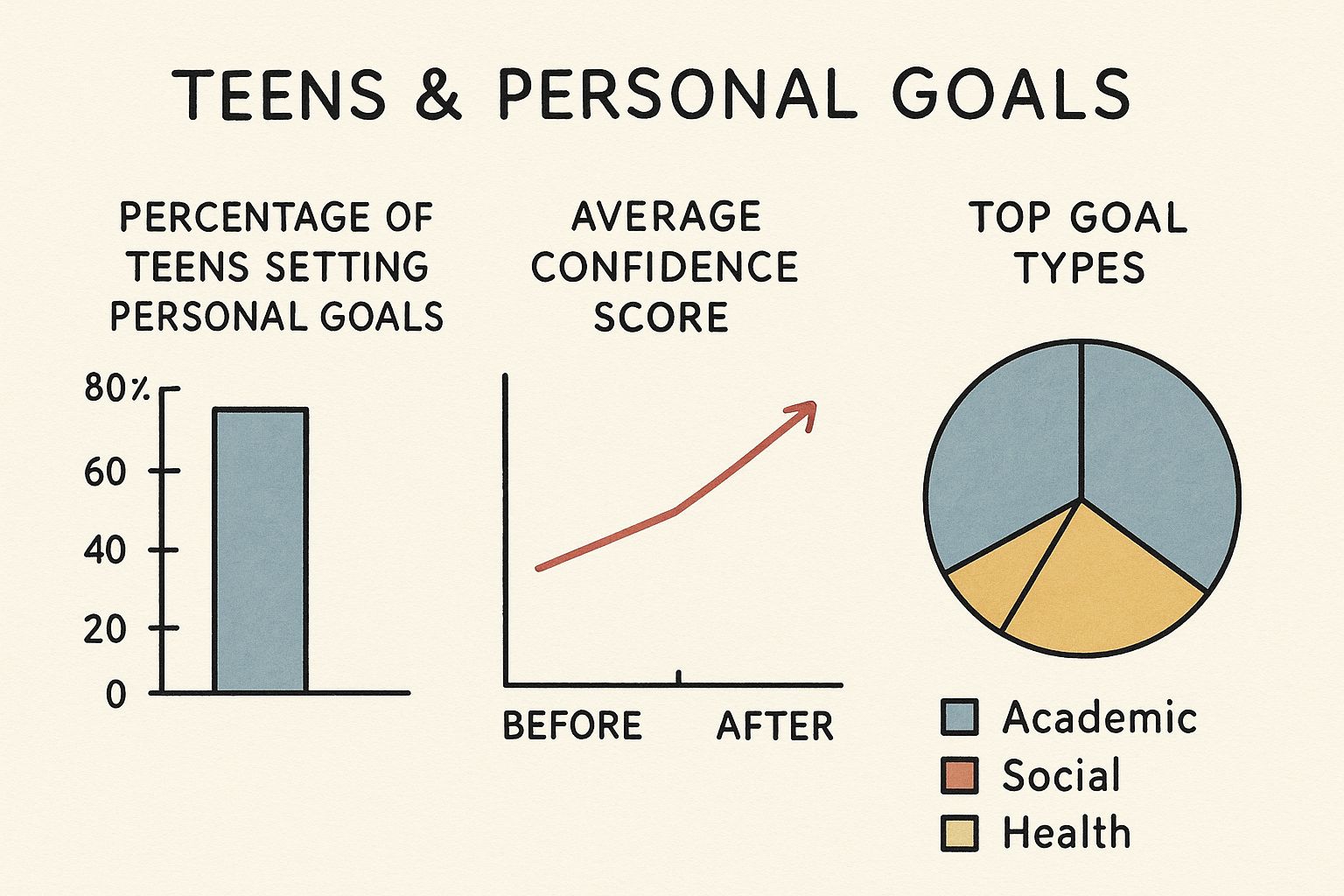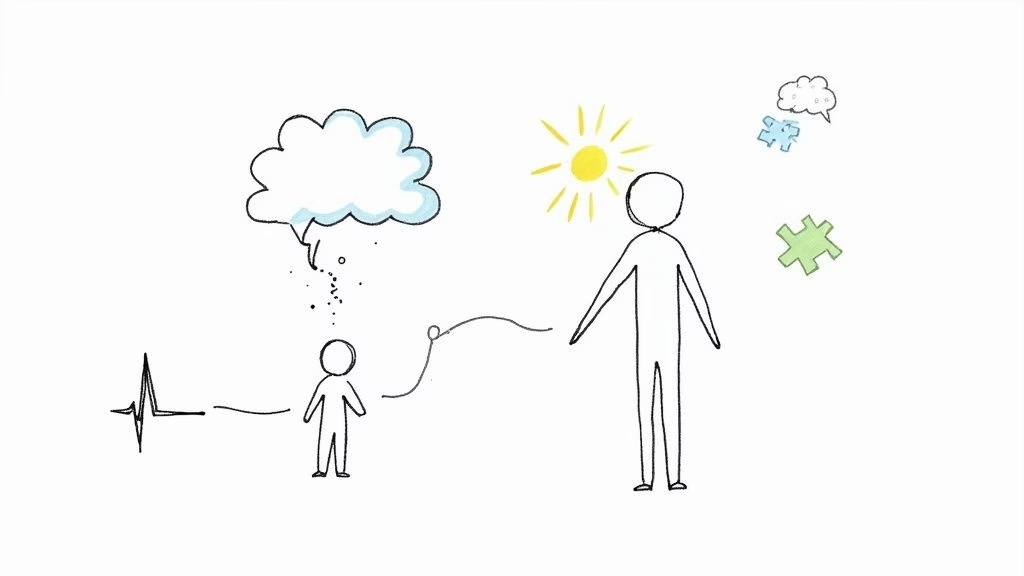Building real, lasting confidence in a teenager isn't about just giving them pep talks. It starts with getting into their world and understanding the unique pressures they're up against today. It means creating a space at home that values effort way more than perfection, listens to their feelings without judgment, and gives them actual tools to handle the non-stop stress from school, social media, and that critical inner voice.
Why Teen Confidence Is More Fragile Than Ever

Parenting a teenager right now can feel like you’ve been dropped into a whole new world. The classic teen struggles are still there, of course, but they’re cranked up to eleven by a ton of modern challenges that can absolutely crush self-esteem. The pressure is coming from everywhere—the endless comparison on social media, the insane academic expectations—it just doesn't let up.
This isn’t just a hunch; the numbers tell a pretty scary story. The need to build confidence in teenagers has never been more urgent. Globally, about 14% of kids between 10 and 19 are dealing with a mental health crisis. Think about that. And with nearly 40% of high schoolers saying they feel persistently sad or hopeless, it's undeniable that these external pressures are doing real damage. If you want to get the full picture on these trends, from social media's role to academic burnout, you can read the full research about the youth mental health crisis.
The Modern Landscape of Teen Anxiety
Today’s teens are living their lives on a public stage. Their social wins and losses, their grades, their friendships—it’s all on display. This constant performance creates the perfect storm for anxiety and self-doubt to grow. To really help, we have to understand what they're actually dealing with.
Here are the big ones I see every day:
- Academic Pressure: It’s not just about getting good grades anymore. It’s about getting perfect grades to get into the “right” college. This mindset makes teens feel like their entire self-worth is wrapped up in their report card, leading to crippling burnout and a fear of failure that stops them from even trying.
- Social Media's Influence: Instagram and TikTok are not real life, but they feel like it to a teenager. They’re scrolling through a never-ending highlight reel of their peers' seemingly perfect lives, which makes it almost impossible not to feel like they're falling short. The pressure to create and maintain their own flawless online image is exhausting.
- Procrastination and Motivation: When a teen is overwhelmed by all of this, procrastination kicks in. But it's not laziness. It's a coping mechanism for intense anxiety. This creates a vicious cycle: they procrastinate to avoid the stress, then feel guilty and fall even further behind, which just tanks their confidence even more.
Understanding the 'why' behind a teen's struggle is more important than just addressing the behavior. Procrastination isn't the problem; it's a symptom of underlying anxiety or a fear of not being good enough.
Special Challenges for Teen Boys
While every teenager is navigating a minefield, teen boys often face a unique set of expectations that can make it incredibly hard to build genuine confidence. So many young men are still taught, directly or indirectly, to bottle up their feelings and never show vulnerability. When they inevitably struggle, this leaves them feeling completely isolated.
This is exactly why resources specifically for teen boys and young men are so incredibly important. Things like men's groups and mentorship programs give them a safe space to actually talk about what’s going on inside, without fear of judgment. It helps them build a confidence that’s authentic, not one based on outdated, tough-guy stereotypes.
Once we really grasp these modern challenges, we can shift from just loving our teens to truly getting them. And that’s when we can start using the practical, effective strategies that actually make a difference.
Parenting Strategies That Actually Build Self-Worth
One of the most powerful shifts a parent can make is moving from being the manager of your teen's life to their trusted consultant. Building real, lasting confidence in a teenager isn’t about big, dramatic gestures. It's found in the small, consistent actions that quietly communicate unconditional love and respect.
It all starts with validating their feelings, even when you don't agree with their choices.
Imagine your teen walks in the door, completely crushed after failing a test they studied hard for. The instinct for many of us is to jump straight into problem-solving mode: "Well, what did you get wrong? Did you talk to the teacher about it?"
Instead, try hitting pause and validating first. Something as simple as, "That sounds so frustrating. I know how hard you worked on that, and it's okay to be upset," can change everything. It creates a safe space for them to just feel, without judgment.
This approach builds a foundation of security. It shows them their worth isn't tied to their performance, but to who they are. It’s about celebrating their effort, not just the final grade.
Moving Beyond Motivation to Connection
Here's a truth I've learned from coaching countless teens: genuine motivation almost never comes from lectures or pressure. It grows from feeling understood and supported. When a teen procrastinates, it's rarely about laziness. It’s usually a symptom of anxiety or feeling totally overwhelmed. Connecting with them on that emotional level is where the magic happens.
A huge hurdle for many teens is their self-image, and this challenge is often more intense for girls. The numbers are pretty sobering. In the UK, a staggering 61% of girls aged 10-17 report having low self-esteem. Body image is a major driver, with 35% admitting they've stopped eating because of worries about their bodies. This isn't just a UK problem; in the USA, 4 out of 5 teenage girls feel unhappy with how they look.
These statistics are a wake-up call, highlighting just how much empathetic parenting matters. At the same time, protecting a teen's self-worth means being vigilant. Recognizing the key indicators of bullying is a critical skill for parents, helping you step in before outside forces tear down their internal confidence.
Actionable Communication That Builds Trust
To really foster genuine confidence, we have to get intentional with our words. This means moving beyond generic praise like, "You're so smart." Instead, get specific and focus on the process.
- Praise Their Effort: "I saw how you broke down that huge history project into smaller chunks. That was a really strategic way to tackle it." This highlights their problem-solving skills, not just an innate trait.
- Acknowledge Their Resilience: "I know that friendship issue was really tough last week. I'm proud of how you handled it with so much maturity." This reinforces their emotional strength.
- Validate Their Emotions: "It makes total sense that you're feeling anxious about the game. It's a big deal." This shows you hear them without brushing their feelings off as teen drama.
Sometimes, seeing the difference between helpful and hurtful habits side-by-side can make it click.
Confidence-Building Actions vs. Confidence-Undermining Habits
| Confidence-Building Action | Potential Undermining Habit | Why It Matters |
|---|---|---|
| Praising effort and strategy. "You really stuck with that tough math problem." | Praising only outcomes. "You got an A! You're so smart." | Praising effort teaches them that growth comes from hard work, not just innate talent. It builds resilience when they fail. |
| Validating their feelings. "That sounds really frustrating. It's okay to be upset." | Dismissing or "fixing" feelings. "Don't be sad, it's not a big deal. Just study harder next time." | Validation creates emotional safety. It shows your teen their feelings are legitimate, building trust and self-awareness. |
| Asking open-ended questions. "How did that feel for you?" | Giving unsolicited advice. "You should have done it this way…" | Questions empower your teen to find their own solutions, fostering independence and problem-solving skills. |
| Letting them experience natural consequences. (Within reason) | Rescuing them from every mistake. | Allowing small failures teaches accountability and shows them they are capable of recovering from setbacks on their own. |
These small shifts in communication can fundamentally change your relationship and empower your teen to build a solid sense of self-worth from the inside out.

As the image shows, the simple act of setting and working toward a personal goal—whether it’s in school, sports, or just a new hobby—gives a teen a measurable confidence boost. It’s the process that builds them up.
Key Takeaway: Shift your goal from raising a "successful" teen to raising a resilient one. Confidence isn't the absence of failure; it's the belief that you can get back up after you fall.
Your role is to be the safe harbor they can always return to, not the captain trying to steer their ship. When you provide that unwavering support, you give them the courage to navigate their own journey, bumps and all.
Helping Your Teen Navigate School Stress and Procrastination

For a lot of teens, school is the main arena where their confidence gets either built up or torn down. It’s a storm of pressure from grades, deadlines, and social dynamics, and it's no wonder procrastination feels like the only escape hatch.
But procrastination isn't laziness. More often than not, it's a sign of feeling completely overwhelmed. When a massive project or a tough exam is staring them down, the anxiety can be paralyzing. The secret to building confidence in teenagers academically is helping them break that cycle of stress and avoidance. It all starts when we shift the focus from the final grade to the actual process of learning and growing.
Taming the Overwhelm
Throwing a complex time management system at an already stressed-out teen usually feels like just another chore. Instead, I find it's best to start with simple, visual strategies that make huge tasks feel manageable.
Here are a couple of things that work:
- Chunk It Down: Sit down with your teen and break a huge project into small, concrete steps. A "research paper" suddenly becomes "find five sources," "write the outline," and "draft the intro." Each small win delivers a little hit of dopamine that builds momentum and motivation.
- Introduce the Pomodoro Technique: This one is a game-changer. Suggest they work in focused 25-minute sprints, followed by a 5-minute break. It's a simple method that makes it easier to just start, because "only 25 minutes" feels a lot less intimidating than "three hours of homework."
The goal isn't to get rid of stress entirely—that's impossible. It's about giving your teen the tools to manage it. When they see they can handle tough tasks one step at a time, their self-belief grows, and procrastination starts to lose its grip.
Unplugging for Mental Clarity
Constant academic pressure needs an off-ramp. Introducing mindfulness and calming activities can provide that crucial mental reset, which is essential for maintaining focus and confidence.
Even a simple mindfulness exercise can make a world of difference. Try guiding them through a quick meditation: "Close your eyes and take three slow, deep breaths. Just notice the feeling of the air moving in and out of your lungs. For the next minute, that’s your only job." This simple practice can quiet a racing mind before a test or a long homework session.
Encouraging creative, calming hobbies can also be a huge help for teens looking to unwind. For example, they might find a new, relaxing outlet by exploring cross-stitch as a calming hobby.
Focusing on the Future with Optimism
It's so easy for teens to get stuck in the belief that their entire future hinges on their high school transcript. It's our job to help them see the bigger picture.
Surprisingly, despite all the pressure they're under, many teens are actually hopeful about their careers. A recent survey found that 94% of American teens are optimistic about their future jobs.
But that optimism is mixed with anxiety. 57% feel AI could negatively impact their job prospects, and only 40% believe a four-year degree is the only way to go. In fact, 56% value real-world experience more.
Having these kinds of conversations helps reframe school. It's not the final destination; it's just one of many paths to a fulfilling life. That perspective can relieve an immense amount of pressure, freeing them up to engage with their education out of genuine curiosity, not fear.
Vital Resources for Teen Boys and Young Men
Teen boys get hit with a unique, unspoken pressure to just "be tough" and push down any sign of vulnerability. It’s a societal script that can quietly crush their confidence, making them feel totally alone when they’re struggling. To actually give them the support they need, we have to recognize what they’re up against and point them toward resources that build a healthier, more real version of what it means to be a man.
I can’t overstate the power of positive male mentorship. When a young guy sees an adult male show emotion, admit he doesn't have all the answers, or practice empathy, it’s like giving him permission to do the same. This is absolutely critical for building confidence in teenagers, especially for boys who might not have that kind of role model in their day-to-day life.
Where to Find Support and Community
The good news is, there are some incredible organizations out there dedicated to helping teen boys and young men build emotional intelligence and resilience. They’ve created spaces where being vulnerable is a sign of strength, not something to be ashamed of.
Here are a few that really stand out:
- A Call to Men: This organization is all about educating men and boys on what healthy, respectful masculinity looks like. Their work challenges those old, harmful stereotypes that tie a man's success to being dominant or emotionally shut down.
- The Man Cave: Based in Australia, this is a preventative mental health and emotional intelligence charity for young men. They run programs that create safe spaces for teen boys to open up, talk about what’s really going on, and build real connections with their peers and mentors.
- Online Communities & Podcasts: There’s been an explosion of podcasts and online forums focused on men's mental health. These are super accessible ways for young men to hear stories from others who've been through similar stuff, which can make a huge difference in feeling less isolated.
The most confident men aren't the ones who never feel fear or sadness. They're the ones who have the guts to face those feelings and work through them. Real strength is about emotional honesty.
Practical Steps for Mental Well-being
Beyond finding a group, introducing some practical mental health tools can be a total game-changer. For a teen boy who's stuck in a cycle of procrastination or dealing with anxiety about school, simple mindfulness techniques can bring immediate relief. A guided meditation is a powerful way to quiet a mind that’s racing a million miles an hour.
It doesn’t have to be complicated.
A Simple Meditation Guide for Teens:
- Find a quiet spot. Just sit comfortably in a chair, feet flat on the floor, hands in your lap.
- Focus on your breath. Close your eyes and take a few slow, deep breaths. Pay attention to the feeling of the air coming in and out.
- Scan your body. Mentally check in with your body, from your toes all the way up to your head. Don't judge or try to fix anything, just notice where you feel tight or relaxed.
- Let thoughts pass. Your mind is going to wander. That's normal. When a thought pops up, just notice it and gently bring your focus back to your breathing.
- Start small. Seriously, just try this for 3-5 minutes a day.
Getting young men to engage with these kinds of resources is a huge step in building authentic confidence—the kind that’s resilient, emotionally aware, and free from those outdated, damaging stereotypes.
A Simple Guide to Mindfulness for Teens

When the pressures of school, social life, and the future start piling up, it's easy to feel overwhelmed. I’ve been there. The most powerful tool I found for building real confidence didn't come from getting good grades or fitting in—it came from within.
That tool is mindfulness.
It isn't some complex spiritual practice reserved for gurus. Think of it as a practical mental toolkit. It’s about learning to manage stress, quiet the constant noise in your head, and observe your thoughts without letting them run the show.
This kind of self-awareness is the bedrock of genuine confidence. When a teen can calm a racing mind before a big presentation or manage the sting of social anxiety, they prove to themselves that they can handle whatever comes their way. It shifts their focus from needing everyone else’s approval to finding strength in themselves.
A 5-Minute Meditation Guide for Teens
Getting started with meditation is way simpler than most people think. You don't need any special gear or a silent retreat—just a few minutes and an open mind. This short exercise is perfect for breaking through procrastination or calming down before an exam.
Here’s a simple, guided exercise any teen can try:
- Find a Comfortable Spot: Sit upright in a chair with your feet flat on the floor. Let your hands rest in your lap and gently close your eyes. No need to pretzel yourself into a lotus position.
- Focus on Your Breath: Take a slow, deep breath in through your nose, and let it all out through your mouth. Do this three times. Just notice the feeling of the air moving in and out.
- Acknowledge Your Thoughts: Your mind will wander. That’s what minds do. Instead of fighting your thoughts or getting frustrated, just notice them like clouds passing in the sky. Then, gently guide your focus back to your breathing.
- Do a Quick Body Scan: Briefly bring your attention to different parts of your body, starting from your toes and moving up to your head. Don't try to change anything. Just notice where you feel tension or relaxation.
- Finish with Intention: After a few minutes, slowly open your eyes. Take a second to just notice how you feel, without judgment. A little calmer? A bit more centered?
This simple practice trains your brain to pause instead of panic. When you can anchor yourself in the present moment, you develop the emotional regulation that is absolutely essential for building real, lasting confidence.
Resources for Teen Mental Health
Like any skill, mindfulness gets easier and more effective with practice. The more you do it, the more it becomes a natural habit. Luckily, there are some great resources out there that make meditation accessible and even engaging for teens who might be skeptical.
- Mindfulness Apps: Apps like Calm and Headspace are game-changers. They offer guided meditations designed specifically for teens, tackling everything from exam stress to trouble sleeping. Their short, themed sessions make it super easy to get started.
- Mens Groups: For young men struggling with the pressure to always be "tough" and bottle things up, groups focused on mental wellness can be a huge relief. They provide a safe space to explore these tools without judgment, connecting teen guys with mentors and peers who get it.
When we give teens these internal tools, we help them build a type of confidence that isn’t tied to their grades, their follower count, or what other people think. It’s a skill that will serve them long after they leave home.
For a deeper dive, check out our guide on meditation for teens.
Questions Parents Often Ask About Teen Confidence
It's tough when you see your teen struggling with self-doubt or pulling away. I get these questions from parents all the time, and the answers aren't always what you'd expect. Here’s some real-world advice for navigating these tricky moments.
How Can I Get My Teen to Open Up When They Won't Talk?
Feeling shut out is one of the hardest parts of parenting a teenager, especially when you know they're anxious or their self-esteem has taken a hit. I remember working with a 16-year-old named Jackson who completely stopped talking about his exam stress. He just bottled it all up.
Instead of pushing for a big, serious conversation, his mom tried something different. She left a sticky note on his door that said, "Thinking of you—here to listen whenever you're ready." That tiny, no-pressure gesture was all it took to reopen the door.
If you're hitting a wall, try shifting from demands to gentle invitations.
- Offer to do something together, side-by-side, like a short walk or making a meal. No intense eye contact required.
- Just sit near them without expecting a conversation. Your calm presence speaks volumes.
- Validate what you think they might be feeling. A simple, "It makes sense that you'd feel overwhelmed right now," can be a huge relief for them to hear.
This creates the emotional safety they need to break the silence on their own terms.
Building trust is about consistency, not intensity. Small, steady gestures mean more than one big, forced conversation.
When Is It Time to Get Professional Help?
Sometimes, what you can do at home isn't enough, and that's perfectly okay. The statistics are pretty stark: 14% of adolescents deal with a mental health challenge, and a staggering 40% of high schoolers report feeling persistently sad.
If you notice extreme mood swings, a total loss of motivation that lasts for months, or any mention of self-harm, it's time to bring in a professional. Don't wait.
Here’s a quick guide on what to do when you see certain signs:
| Sign to Watch For | Your Next Step |
|---|---|
| Pulling away from friends & family for weeks | Start by talking with their school counselor. |
| Any talk of self-harm or hopelessness | Contact a therapist immediately for a referral. |
| A sudden and severe drop in grades | Consider an evaluation for ADHD or other learning challenges. |
You're not alone in this. There are great resources out there.
- Look up local mental health clinics in your area.
- Keep crisis hotlines like the 988 Suicide & Crisis Lifeline saved in your phone.
- Explore teen-focused apps like Calm or Headspace, which can be a good first step.
How Do I Motivate My Teen in School?
Nine times out of ten, procrastination isn't about laziness—it's about a deep-seated fear of failure. Another lecture about grades will just make them shut down more. The key is to break overwhelming tasks into tiny, manageable wins.
Instead of saying, "You need to finish that essay," try challenging them to just research one paragraph for the next 10 minutes. When the timer goes off, celebrate that small win with a quick break.
Here are a few other hacks that actually work:
- Pomodoro Sprints: Work for 25 minutes, then take a 5-minute break. It makes starting feel less daunting.
- Visual To-Do Boards: Use a whiteboard or colorful sticky notes to map out tasks. Seeing progress is a powerful motivator.
- Study Buddies: Pair them with a friend for accountability. Sometimes working "together" (even quietly on a video call) is all it takes.
Motivation doesn't come from pressure. It grows when a teen can actually see themselves making progress.
Where Can Teen Boys Find Real Support?
Teen boys are often trapped by the "tough guy" stereotype, making it incredibly hard to admit they're struggling. What they need are communities and mentors who show them a healthier way to be.
Here are a few places that are changing the conversation for young men:
- A Call to Men is an amazing organization focused on promoting healthy, respectful masculinity.
- The Man Cave provides programs and peer support to help boys build practical life skills.
- Podcasts can be a great, low-pressure way to hear real stories. "Modern Manners" is one that tackles relevant topics.
- Online forums like Reddit’s r/MensLib can offer a space for surprisingly candid and supportive conversations.
These resources are a powerful reminder that they’re not alone and that true confidence comes from connection, not from bottling things up.
Ready to give your teen the tools they need to truly thrive?
Personalized coaching can make all the difference. Learn more at Andrew Petrillo Life Coaching.
Let's start with a free discovery call and get your teen on the path to lasting confidence today.



















